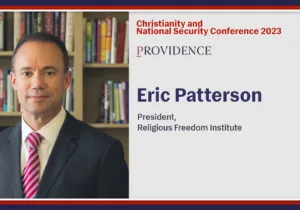If you are a young Christian in America, you have probably heard some confusing things about the relationship between Christianity and the American nation. Maybe when you were growing up you picked up a book by David Barton in your church bookstore and learned that Thomas Jefferson was a completely orthodox Christian. Maybe you’ve heard that it is your Christian duty to vote for a specific political party. Or maybe you’ve heard that the church’s only mission is to save souls, which sounds right to you but seems to imply that the Kingdom of Heaven is totally separate from the civil kingdom, and that anything from total apathy to rabid ideology is fair game when it comes to politics.
So naturally you have questions. Is it possible for a Christian to love his or her country too much? Is America itself even deserving of a Christian’s loyalty? If Christians have anything to offer the civil kingdom, how should they go about it? It’s often the case that we think we can discover the right answer to these questions by distancing ourselves from the wrong answer. Thus, in reaction to someone like Jerry Falwell, some Christians are tempted to say that loving our country is wrong. In reaction to a generation of Christians who equated Christian political witness with preserving the post-war order, some Christians are tempted to say things like “Mayberry leads to hell.” And in reaction to certain problematic politicians claiming America as a “nation of faith,” some Christians are tempted to say that the church is solely concerned with the salvation of souls.
The problem with these reactive stances is that they create many more questions than they answer. And this is hardly surprising when you think about it. A principle that is only reactive is mired in the same context as the problem it is reacting against. It can’t take us very far as a guide for how to live or how to govern. What we really need are principles that will remain true regardless of who is in power and regardless of which “Christian” intellectual is the favored whipping boy of the month.
A list of such principles might include the following:
First, remember that stable political inheritances are worth defending. This may seem obvious, but it bears repeating. Political systems that foster peace and human flourishing are hard to build and easy to destroy. Yes, it’s true that Christians should be prepared to live out their faith in the absence of law, justice, and domestic tranquility. And it’s even true that a completely different political system could secure the public goods necessary for human flourishing. But the system we have inherited is the nation—the American nation. And while our nation is far from perfect, it has for the most part preserved the conditions that make a common life possible: the rule of law, due process, and the protection of human dignity and religious freedom, to name just a few. That inheritance is a gift—maybe not from God himself, but certainly from our ancestors—and as Christians, we are required to accept the burdens of belonging. We are called to submit to legitimate authority, work to preserve our inheritance for future generations, and recognize that the tranquillitas ordinis, as St. Augustine might call it (or Mayberry, if you prefer), is a precious thing and nothing to sneer at.
Second, remember that the American project is great. Notice I didn’t say “America is great.” That may or may not be true at any given time. But the American project is great. Of course, it’s easy to poke holes in many of our founding myths. We know that the settlers in Massachusetts Bay weren’t really seeking religious freedom so much as they were seeking to establish a Puritan theocracy in place of an Anglican one. We know that taxes on tea aren’t really a valid reason to engage in armed insurrection. And we know that several of our more prominent founding fathers were Lockean individualists with a problematic view of human nature. But that’s not the whole story. There were many roads that led to the American founding, and as Christians, we need not revise any history to find our place in the American order. As Emory Law Professor John Witte has shown, there were at least four factions among the founders: the Puritans, the Evangelicals, the Civic Republicans, and the Enlightenment Liberals. It’s often the case that textbooks draw our attention only to the last of those. But the American tradition includes more than Lockean individualists. It also includes public spirited Christians. For every Thomas Paine, there is a John Randolph of Roanoke. We can take them as our model. And like them, we can embrace the endeavor to pursue self-government and build a common life under the rule of law.
Third, do the most good you can where you can. It’s not easy to answer the question of what political theory Christians should ascribe to, or how they should handle political alliances that will inevitably involve compromise. But things don’t always have to be so complicated. In many cases, confusion occurs when we try to fix too many things. The answer is to recognize that we don’t need a solution for everything. Like the Good Samaritan, life will present each of us with specific problems. It’s our duty to act with charity and justice to the problems and people we encounter. This seems easy enough on the small scale, but even with the bigger problems that some of us may be called to work on—like war in the Middle East, the opioid epidemic, or religious freedom—the principle will remain the same. Depending on the issue, we may find ourselves working with one political party more than another. That’s all right. As Wendell Berry reminds us, “This is an age of divorce. Things that belong together have been taken apart. And you can’t put it all back together again. What you can do, is the only thing that you can do. You take two things that ought to be together and you put them together. Two things. Not all things.”
Fourth and finally, be the best Christian you can be. This too may seem absurdly obvious. But it must be the foundation of Christian public witness. Alexis de Tocqueville observed long ago that religious faith in democratic countries would conform itself to the democratic tendencies of deference to the majority and isolation to “spiritual matters.” To go too far down this road is to abdicate the religious duty to check individualistic and democratic impulses—not to mention doctrinal integrity. What Tocqueville observed then can still be observed today. In many churches and Christian conferences, we often encounter a Christianity that is clichéd and minimalist. We hear pastors say “we just love Jesus here” or, as I mentioned above, that “the church is solely concerned with saving souls.” And when we hear this, we must remember that it is sheer democratic cant.
In a sense, of course, these statements are true. As Christians, we should be able to drill down through everything we do and find a love for Christ at the bottom of it all. But a love of Christ should be the foundation of our works—not an excuse to avoid them. That’s what makes the clichéd and minimalist Christianity the true American heresy. In a sense, it is even more dangerous than the obvious and blatant heresy of Jerry Falwell because it so subtly obscures the truth. The truth is that a seemingly simple thing like loving Christ and bringing others to him will have massive implications for our lives and for how we order our society. And it’s our job to figure out what those implications are. The best way to do this is to immerse ourselves in the Christian tradition. Don’t settle for a vague “relationship, not religion” approach to Christianity. Root yourself in the great tradition. If you are a Presbyterian, be a great Presbyterian. If you are a Catholic, be a great Catholic. Be rigid and stodgy and faithful to the dictates of your church. And demand your fellow Christians do the same. Remember that we can only afford to be liberal in our politics so long as we are steady in our inner lives. So avoid cliché like the devil. And be the best Christian you can be. Only then will you find, incidentally, that you also make a good American.
Brian K. Miller is the director of legal and public affairs at the Center for Individual Rights. His writings have appeared in Forbes, Quillette Magazine, The Public Discourse, The University Bookman, and elsewhere. He was named to Forbes 30 under 30 for his work in law and policy in 2018.






 Sponsor a student for Christianity & National Security 2024
Sponsor a student for Christianity & National Security 2024